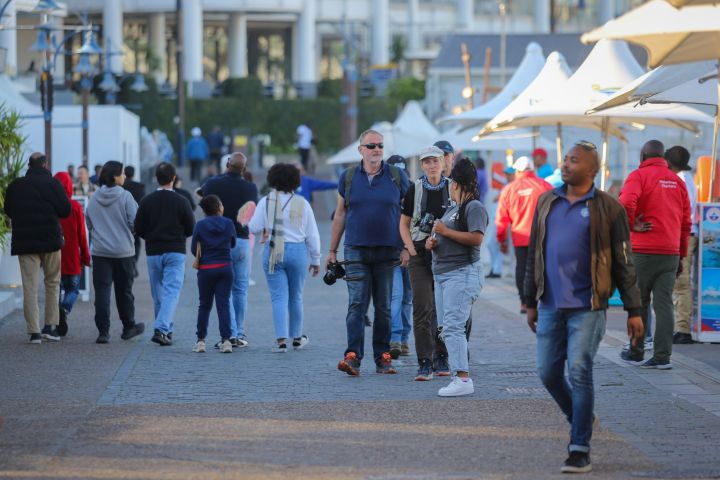TRAVEL BOOST
Tourism, conferences, events and strong demand send parts of hospitality sector into hyperdrive

NightsBridge, Southern Sun and Growthpoint data indicate tourists are back with a bang in Cape Town, while Jozi and KZN are also enjoying some growth.
Tourism in some parts of South Africa is not only expanding on pre-pandemic levels, it’s in hyperdrive.
The latest figures from NightsBridge, a leading property management solution for the hospitality sector, indicate the tourism sector has revived, with significant pre-pandemic growth.
NightsBridge, which links accommodation establishments to the websites that sell their room nights, says total bookings from January to October 2023 have surpassed those from the same period in 2019 by 7.4%.
Its analysis of 4,122 clients since January 2019 also shows a 9.4% year-on-year increase in bookings from 2022 to 2023. Online bookings are up by 17.3% on pre-Covid figures, which it says is due to the sustained rise in convenience in online platforms, as opposed to the marginal rise in offline bookings – 1.6%.
Theresa Emerick, NightsBridge’s co-founder and managing director, says what they are seeing is not just a rebound, but meaningful growth.
“The growth in online bookings is a reflection of evolving traveller behaviours and preferences, as well as the travel industry’s continued adoption of digital solutions as a time-saving administrative convenience.”
Southern Sun’s interim results for the six months ended 30 September, released this week, reveal continued improvement in the hospitality sector, with Cape Town booming – boosted by large events such as the Netball World Cup.
In Gauteng, the group hosted the 15th BRICS Summit in August this year at the Sandton Convention Centre, which resulted in substantial demand for accommodation at its surrounding hotels.
Most regions, it said, have seen good transient demand, with a substantial portion of Southern Sun hotels trading above pre-Covid levels.
The group’s total income for the six-month period was R2.8-billion – up 34% growth on revenue generated in the prior comparative period.
With demand from both local and international travellers back to normal, and strong demand for conferencing and events, occupancy stood at 56.3%, which was up 10.3% and marginally below the 59.1% achieved pre-Covid.
Revenue from rooms was boosted by growth in average room rates, which was up by 11.4% compared with the previous six-month period and by 25.2% compared with the same period in 2019.
Some hotels in Sandton and Rosebank, and the group’s budget offering Sun1 as well as some hotels in its offshore division, have not yet fully recovered but are showing signs of improvement, it said.
Continuous rolling blackouts forced Southern Sun to spend R28-million on diesel in six months, which CEO Marcel von Aulock described as “burning money” (a 64.7% increase on the previous period, with no corresponding savings in electricity which went up in price by 13.8% – water cost 36.4% more).
Western Cape ‘buoyant’
On the bright side, the Western Cape’s “buoyant” trading levels are expected to gain momentum into the festive season.
In the province, the group generated revenue of R745-million (up R494-million on last year) and Ebitda (earnings before interest, taxes, depreciation, amortisation and restructuring or rent costs) of R211-million (up from R89-million).
KwaZulu-Natal was slightly less buoyant but performed well for the group: revenue was R518-million (2022: R466-million) and Ebitda R151-million (2022: R133-million).
Over the weekend, the Sunday Times reported that bidding for a new lease on the Elangeni and Maharani hotels opened on Friday. The 60-year lease held by Southern Sun expires in 2025.
The report quoted the eThekwini municipality saying it was not possible for a simple lease renewal of the property, because the process would not be deemed to be “equitable or competitive”, so it is being opened up for new bidders.
Meanwhile, in an investor update, V&A Waterfront owner Growthpoint reported its lease renewal rate for the quarter was 78.2% (64.9% for the previous quarter) and vacancies improved from 9.4% to 9.1%.
Trading at the V&A has been fuelled by a 32% increase in international air passengers into Cape Town, as well as semigration and high demand for office space.
SA’s largest listed property company, which is valued at R35.2-billion on the JSE, said earnings (before interest and tax) were up 9% on the comparative quarter, lessened by the economy – particularly high interest rates, rolling blackouts and above-inflationary cost increases, which it said are placing pressure on consumers and businesses.
The V&A has negligible vacancies at 0.7%, retail sales increased 20% compared to the prior year and 43% on 2019. Visitor numbers were up 49% on the same quarter in 2022, with high demand for hotels, strong growth in mooring income from the marine and industrial sector, and high demand for the office sector, with zero vacancies.
The TimeOut Market started trading at the Waterfront on 17 November. DM

















 Become an Insider
Become an Insider
Comments - Please login in order to comment.